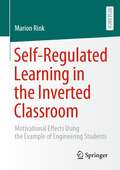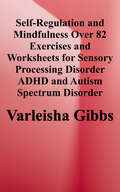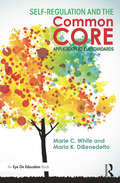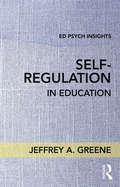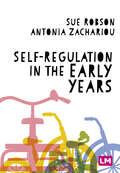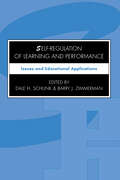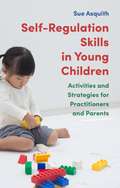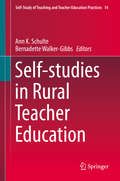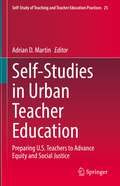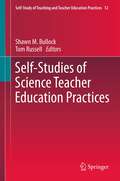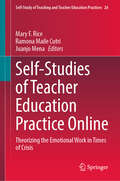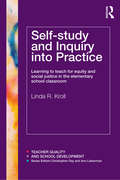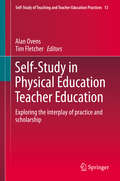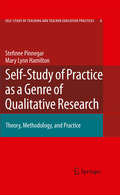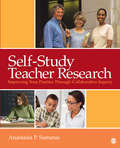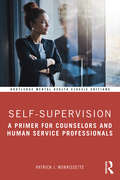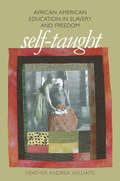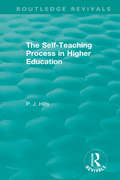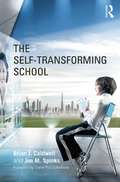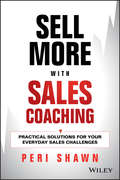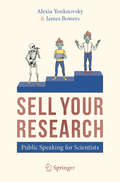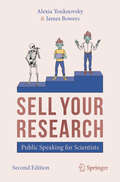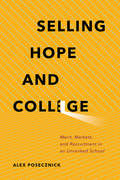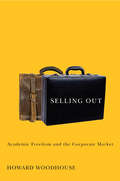- Table View
- List View
Self-Regulated Learning in the Inverted Classroom: Motivational Effects Using the Example of Engineering Students
by Marion RinkThe Inverted Classroom is a blended learning scenario that consists of two phases: In the Online Phase the learners acquire learning content using interactive learning materials, primarily videos, provided by the teacher online. In a second stage, there is an Attendance Phase at the higher education institution with the purpose of learners processing, practising and deepening their understanding of what they have already learnt in a class with other stakeholders. Based on the Self-Determination Theory of Richard M. Ryan and Edward L. Deci, this qualitative study examines how learning in the Inverted Classroom affects the basic psychological needs of autonomy, competence and relatedness of higher education engineering students. A central aspect is the promotion of the students' intrinsic learning motivation through support measures and appropriate didactical design.
Self-regulation and Mindfulness: Over 82 Exercises and Worksheets for Sensory Processing Disorder, ADHD, and Autism Spectrum Disorder
by Varleisha GibbsThe author has created a unique, evidence-based resource for helping children who have trouble self-regulating, staying focused, managing their senses and controlling their emotions. <p><p>Based on the latest research in neuroscience, Self-Regulation and Mindfulness provides highly practical, kid friendly lessons to teach therapists, parents, educators and children about their brain and body, so they can build the needed skills to self-regulate. <p>- Hands-on activities <p>- Step-by-step exercises <p>- Coloring pages and worksheets <p><p>Clear, concise and fun activities to address your children's arousal, attention, and social participation: <p>- Touch and Heavy Work <p>- Hydration and Oral Motor Activities <p>- Metronome, Timing and Sequencing Exercises <p>- Right and Left Brain Integration Methods <p>- Patterns and Repetition Recognition <p>- Vision and Sound Skills <p>- Movement Coordination <p>- Inhibition Techniques
Self-Regulation and the Common Core: Application to ELA Standards
by Marie C. White Maria K. DiBenedettoThe Common Core State Standards for English Language Arts created new challenges for teachers and pre-service instructors. Self-regulated learning, using one’s thoughts, feelings, and behaviors to reach goals, can help students become independent, self-directed learners. This book provides educators the support they need to apply the principles of self-regulated learning in their teaching for success with the Common Core. In this book, Marie C. White and Maria K. DiBenedetto present information on how to apply academic self-regulation by integrating two models: one which addresses how students develop self-regulatory competence, the other which focuses on the various processes within the three phases of self-regulated learning. In addition, Self-Regulation and the Common Core provides specific lesson plans for grades K-12, using the standards and the integrated framework to promote higher order thinking and problem-solving activities.
Self-Regulation in Education (Ed Psych Insights)
by Jeffrey A. GreeneSelf-regulation in education is a familiar and important topic for all educators: professors, administrators, teachers, researchers, journalists, and scholars. As educational standards require that students take control of what and how they learn, self-regulation skills are essential to student success. Written by a leading expert on self-regulation and self-regulated learning, this book situates the topic within the broader context of educational psychology research and theory, bringing it to a wider audience. With chapters on the fundamentals of self-regulation, explanations of its uses, and advice for best application, this concise volume is designed for any education course that includes self-regulation in the curriculum. It will be indispensable for education researchers and both pre- and in-service teachers alike. Jeffrey A. Greene is Associate Professor in the Learning Sciences and Psychological Studies program in the School of Education at the University of North Carolina at Chapel Hill, USA.
Self-Regulation in the Early Years
by Sue Robson Antonia ZachariouThis book supports students of Early Childhood Studies, Early Years and related disciplines to understand self-regulation in the early years. It explores what self-regulation is and includes evidence from cognitive, developmental and behavioural psychology and neuroscience. It asks why self-regulation is so central for children and why it is so important for practitioners to support and develop it in young children. The book explores how self-regulation underpins much of children’s development, including social, emotional and cognitive development. Key contexts for self-regulation, in particular aspects such as play and talk, are covered. This book supports students to: - know why self-regulation matters - understand why self-regulation is increasingly evident in policy and curricular around the world - focus on social, emotional and behavioural aspects of self-regulation - explore the importance of relationships in self-regulation – between children and adults and between children themselves - effectively observe and document self-regularion
Self-Regulation in the Early Years
by Sue Robson Antonia ZachariouThis book supports students of Early Childhood Studies, Early Years and related disciplines to understand self-regulation in the early years. It explores what self-regulation is and includes evidence from cognitive, developmental and behavioural psychology and neuroscience. It asks why self-regulation is so central for children and why it is so important for practitioners to support and develop it in young children. The book explores how self-regulation underpins much of children’s development, including social, emotional and cognitive development. Key contexts for self-regulation, in particular aspects such as play and talk, are covered. This book supports students to: - know why self-regulation matters - understand why self-regulation is increasingly evident in policy and curricular around the world - focus on social, emotional and behavioural aspects of self-regulation - explore the importance of relationships in self-regulation – between children and adults and between children themselves - effectively observe and document self-regularion
Self-regulation of Learning and Performance: Issues and Educational Applications
by Barry J. Zimmerman Dale H. SchunkIn recent years, educators have become increasingly concerned with students' attempts to manage their own learning and achievement efforts through activities that influence the instigation, direction and persistence of those efforts. In 1989, Zimmerman and Schunk edited the first book devoted to this topic. They assembled key theorists offering a range of perspectives on how students self-regulate their academic functioning. One purpose of that volume was to provide theoretical direction to ongoing as well as nascent efforts to explore academic self-regulatory processes. Since that date, there has been an exponential surge in research. This second volume on academic self-regulation offers the fruits of the first generation of research. It also addresses a number of key issues that have arisen since then such as how self-regulation differs from such related constructs as motivation and metacognition, and whether students can be taught self-regulatory skills. The contributors reveal an interesting, uplifting, and at times, disturbing picture of how students grapple with the day-to-day problems of achieving in circumstances with inherent limitations and obstacles. This volume provides insight into the source of students' capabilities to surmount adversities -- the origins of their self-initiated processes designed to improve learning, motivation, and achievement. The text is organized on the basis of a conceptual framework that analyzes academic self-regulation into four major dimensions. That model is presented in the first chapter, and key processes that influence each of these dimensions are discussed by prominent researchers in the chapters that follow. Because each chapter is written to follow a common format, this work provides a level of continuity and parsimony normally found only in authored textbooks.
Self-Regulation Skills in Young Children: Activities and Strategies for Practitioners and Parents
by Sue AsquithThis essential handbook for all early years practitioners provides a wider awareness of self-regulation in babies and young children. It emphasises the importance of giving children positive attachments and empathy, and provides fun ideas of how to promote coping strategies for them.The book explains what self-regulation is and why it is important, as well as making child and brain development easy to understand. It shows what self-regulation looks like in practice and how early years practitioners can support children to develop it with 30+ activities. The first part of the book offers accessible explanations and theory, and the second half provides reflective points, activities and case studies to support some of the information provided in part one. The strategies, activities and tips can be easily applied in childcare settings and shared with parents.
Self-studies in Rural Teacher Education
by Ann K. Schulte Bernadette Walker-GibbsThe purpose of this book is to highlight the work of teacher educators in the field of rural education. In this book, education faculty who work in teacher education study the ways in which one's identity impacts one's teaching and the partnerships with rural schools. Although the field of research on teacher preparation has an abundance of studies on preparing students for the challenges of urban settings, there is much less emphasis on rural education, despite the prevalence of rural schools. This book problematises notions of rural or rurality which is often considered via a deficit or a generalised model where a stereotype of one kind of rural is outlined. Developing more multi-faceted understandings of rurality is a key to attracting and retaining teachers who understand the complexities and opportunities of living and working in rural spaces.
Self-Studies in Urban Teacher Education: Preparing U.S. Teachers to Advance Equity and Social Justice (Self-Study of Teaching and Teacher Education Practices #25)
by Adrian D. MartinThis book critically explores pedagogical activities, policies, and coursework that teacher education programs can provide to more fully prepare teacher candidates and in-service educators for professional practice in urban schools. It illustrates how teacher educators from across the United States are supporting teacher candidates and in-service teachers to possess the knowledge, skills, and dispositions for equity-oriented instructional practices and advocacy for professional engagement in the urban context. Chapters share insider perspectives of urban teacher education on preparing teachers to teach in culturally, linguistically, and socio-economically diverse classrooms. They discuss teacher educators’ learning about their own practice in the preparation of teachers for city schools, preparing teacher candidates from rural and suburban contexts to teach in urban settings, and supervising practicing teachers in city classrooms. The volume also focuses on the interplay of cultural and linguistic parity between teacher educators and their preservice/in-service teacher students, implementing learning activities or coursework about teaching in urban schools, and enacting critical pedagogical practices. This book will be beneficial to teacher educators focused on teacher preparation for city classrooms and urban school districts, and researchers seeking to adopt self-study methodology in their own research endeavors.
Self-Studies of Science Teacher Education Practices
by Shawn M. Bullock Tom RussellPart of a vital Springer series on self-study practices in teaching and teacher education, this collection offers a range of contributions to the topic that embody the reflections of science teacher educators who have applied self-study methodology to their own professional development. The material recognizes the paradox that lies between classroom science and the education of science teachers: the disciplines of science are often perceived as a quest for right answers, an unintentional by-product of the classroom focus on right answers in student assessment in science. In contrast, the profession of teaching has few right answers and frequently involves the management of conflicting tensions. A dilemma thus arises in science teacher education of how to shift perspectives among student teachers from reductionist to more inclusive attitudes that are open to the mercurial realities of teaching. The self-studies presented here are unique, fresh and stimulating. They include the input of a beginning science teacher as well as science teacher educators from a range of backgrounds and varying levels of experience. In addition, the volume presents a truly international perspective on the issues, with authors hailing from five countries. Providing analysis at the leading edge of education theory, this collection will make fascinating reading for those teaching science--as well as those teaching science teachers.
Self-Studies of Teacher Education Practice Online: Theorizing the Emotional Work in Times of Crisis (Self-Study of Teaching and Teacher Education Practices #26)
by Juanjo Mena Mary F. Rice Ramona Maile CutriThis edited volume explores the emotional work of being an online teacher educator. The chapter authors discuss the intense work involved in planning, teaching, and navigating intuitional contexts in order to build a relationship between online teaching and the Self-Study of Teacher Educator Practice (S-STEP) methodology. Additionally, the authors of the chapters in the book used the S-STEP methodology to move their practices and their teacher-educator identities beyond emergency/crisis uses of online teaching common during campus building closures. Each chapter offers different ways that S-STEP methodology can be used to sustain oneself as an online teacher educator. Although there are specific strategies and practices, this is not a ‘how-to’ book for online teacher educating—it is an exploration of online teachers and groups of online teachers supporting themselves and each other by studying and learning from their practices.
Self-study and Inquiry into Practice: Learning to teach for equity and social justice in the elementary school classroom (Teacher Quality And School Development Ser.)
by Linda R. KrollThere are new pressures and familiar pressures on teacher educators to prepare teachers who will be able to teach successfully in a changing world, and who will be able to change the world. The question of how to prepare well-qualified teachers has become an international question with global responses and consequences. This book describes a stance
Self-Study in Physical Education Teacher Education
by Alan Ovens Tim FletcherIn this in-depth examination of self-study as a research methodology, an international selection of physical education scholars share their ideas and experiences and consider the value of self-study as a vector for highlighting the emerging conflicts, dilemmas, and debates currently developing in teaching and teacher education pedagogies. A vital new addition to Springer's series Self-Study of Teacher Education Practices, the volume is divided into three sections assessing the significance of the approach itself, offering detailed subject-relevant case studies, and exploring the nuances and controversies attending the evolution of the methodology. The contributors show how self-study enables reflexivity in pedagogical practice, a notable lacuna in current critical research, and at the same time they make the technique accessible to scholars of physical education wanting a practicable introduction to the subject. The analysis also explores the implications of applying self-study to pedagogy itself, to the curriculum, and to human movement and educational practice more generally. By embracing more organic, emergent notions of research practice and learning, the book achieves a broader and more inclusive survey of pedagogical work in physical education teacher education that fully acknowledges the complexities of the field.
Self-Study of Practice as a Genre of Qualitative Research
by Mary Lynn Hamilton Stefinee PinnegarTeacher educators live hectic lives at institutional and discipline boundaries. Our greatest potential for influence is through developing relationships with others in our practice. Our work is fundamentally relational and emotional. We are obligated to the teachers we teach and the public students they teach. Our practice exists in the midst of experience, conflicting and often hostile boundaries, and between what we know from research and what we understand from practice. Self-study of practice invites researchers to embrace the hectic and fragmented territory of practice as the space for study. This book educates those who would like to explore practice in the methodology of self-study. It provides both a pragmatic and theoretic guide. It grounds the research in ontology and establishes dialogue as the inquiry process. It supports researchers through the use of frameworks to guide research and explication of strategies for conducting it.
Self-Study Teacher Research: Improving Your Practice Through Collaborative Inquiry
by Anastasia P. SamarasThe first textbook to offer novice and experienced teachers guidelines for the "how" and "why" of self-study teacher research Designed to help pre- and in-service teachers plan, implement, and assess a manageable self-study research project, this unique textbook covers the foundation, history, theoretical underpinnings, and methods of self-study research. Author Anastasia Samaras encourages readers to think deeply about both the "how" and the "why" of this essential professional development tool as they pose questions and formulate personal theories to improve professional practice. Written in a reader-friendly style and filled with interactive activities and examples, the book helps teachers every step of the way as they learn and refine research skills; conduct a literature review; design a research study; work in validation groups; collect and analyze data; interpret findings; develop skills in peer critique and review; and write, present, and publish their studies. Key Features A Self-Study Project Planner assists teachers in understanding both the details and process of conducting self-study research. A Critical Friends Portfolio includes innovative critical collaborative inquiries to support the completion of a high quality final research project. Advice from the most senior self-study academics working in the U.S. and internationally is included, along with descriptions of the self-study methodology that has been refined over time. Examples demonstrate the connections between self-study research, teachers' professional growth, and their students' learning. Tables, charts, and visuals help readers see the big picture and stay organized.
Self-Supervision: A Primer for Counselors and Human Service Professionals (Routledge Mental Health Classic Editions)
by Patrick J. MorrissetteSelf-Supervision synthesizes the literature on the theory and practice of self-supervision and provides counselors and human service professionals with a plan for the pursuit of independent professional growth. The classic edition includes a new preface from the author reflecting on his work and on the changes in society and the field since the book’s initial publication. In these chapters, professionals will find cost-effective and efficient strategies for developing their skills while still ensuring that they’re providing quality treatment. They’ll also find a diverse array of strategies for self-supervision and a thoughtful discussion of reflective processes required to effectively evaluate one’s own practices.
Self-Taught
by Heather Andrea WilliamsIn this previously untold story of African American self-education, Heather Andrea Williams moves across time to examine African Americans' relationship to literacy during slavery, during the Civil War, and in the first decades of freedom. Self-Taught traces the historical antecedents to freedpeople's intense desire to become literate and demonstrates how the visions of enslaved African Americans emerged into plans and action once slavery ended.Enslaved people, Williams contends, placed great value in the practical power of literacy, whether it was to enable them to read the Bible for themselves or to keep informed of the abolition movement and later the progress of the Civil War. Some slaves devised creative and subversive means to acquire literacy, and when slavery ended, they became the first teachers of other freedpeople. Soon overwhelmed by the demands for education, they called on northern missionaries to come to their aid. Williams argues that by teaching, building schools, supporting teachers, resisting violence, and claiming education as a civil right, African Americans transformed the face of education in the South to the great benefit of both black and white southerners. In this previously untold story of African American self-education, Heather Andrea Williams moves across time to examine African Americans' relationship to literacy during slavery, during the Civil War, and in the first decades of freedom. Some slaves devised creative and subversive means to acquire literacy, and when slavery ended, they became the first teachers of other freedpeople. Williams argues that by teaching, building schools, supporting teachers, resisting violence, and claiming education as a civil right, African Americans transformed the face of education in the South to the great benefit of both black and white southerners.-->
The Self-Teaching Process in Higher Education (Routledge Revivals)
by P.J. HillsOriginally published in 1976 The Self-Teaching Process in Higher Education looks at the major changes that took place in the structure of university education. The book looks at how more emphasis was placed on students to take responsibility for their own progress by becoming self-directed individuals. Traditional methods of university education and some alternative approaches are considered in light of course needs of both students and teachers. Self-teaching is then examined in the overall context of the learning process. The book looks at three case studies of the development and use of self-teaching systems, one for chemical bonding, one for electrical circuits and a third for audio-visual communication.
The Self-Transforming School
by Brian Caldwell Jim SpinksThe Self-Transforming School combines an insightful meta-analysis of factors contributing to the success of schools, and an examination of powerful mega-trends that are shaping developments in education, to offer the first mega-analysis in education policy and practice. The book spans fifty years, beginning with Caldwell and Spinks’ ground-breaking work The Self-Managing School which advocated innovative approaches that are now accepted as preferred practice, before offering a prognosis and plan for the future. The book argues that all schools in all settings can secure success for all students in an era where society and the economy are changing constantly and dramatically. Although schools find some support in local and global networks, externally designed re-structuring, re-staffing, or command-and-control direction isn’t sufficient to achieve transformation. Instead of replicating particular approaches to achieve modest improvement, leadership of the highest quality needs to be deeply embedded in schools and their systems. Caldwell and Spinks propose three important points that need to be taken into consideration:-schools are often at different stages of self-transformation -self-transformation requires a high level of professionalism, and must include teacher education and on-going professional development -funding is critically important, and efforts to build a capacity for self-transformation are constrained by what is available. The book gives particular attention to developments in Australia, Brazil, Canada, England, Finland, Hong Kong, India, New Zealand, Shanghai, Singapore and the United States. It will be of key interest to school leaders, policy makers, and academics and postgraduate students engaged in research on equity, student performance in highly disadvantaged settings and education policy.
Sell More With Sales Coaching
by Peri ShawnSales coaching tools and strategies to help you sell moreSales executives and business leaders are looking for ways to increase their revenues without major changes to their technology, processes or workforce management. When done effectively, sales coaching can be the catalyst that improves sales results, team morale and employee retention. Sell More with Sales Coaching provides results-proven sales coaching material that includes assessment, exercises and sales coaching questions.As a result of applying the tools and strategies in this book, sales leaders and teams will drive higher revenues and performance by:Assessing team members' sales capacitiesDetermining what type of coaching is needed on an individual basisIdentifying sales mistakes being committed by salespeopleCoaching salespeople to avoid committing sales mistakesImproving the quality of sales conversationsIncreasing the quality of conversations within the teamLeveraging the use of CRM during sales coachingThe author's company, the Coaching and Sales Institute, has worked with large sales forces and provided training for the launch of the debit card, and one of the fastest-growing divisions of the Royal Bank of Canada.
SELL YOUR RESEARCH: Public Speaking for Scientists
by Alexia Youknovsky James BowersPublic speaking is an essential component in the life of a scientist, whatever your level of career. In this book, the authors describe a tried-and-tested technique for preparing a presentation: the SELL Method. Following these three simple steps - Skeleton, Envelope, Life & Logistics - will help you make the most out of any talk. Whether it be a 3-minute pitch or an hour-long plenary session, you will find pages of advice, theory and practical exercises enabling you to SELL YOUR RESEARCH with impact.For scientists these days, the work is not done until it is communicated. And now that problem is solved. Solidly researched and immaculately written, Sell Your Research is a goldmine of useful advice. Whether you are brimming with confidence or just setting out, this gem of a guidebook will improve every presentation and nurture every budding science communicator.Dr. Stephen Webster, Director of Science Communication Unit, Imperial College LondonPublic speaking is one of the most intimidating but crucial tasks in a scientist’s career. This book provides a welcoming, clear, step-by-step guide to improving your presentations at every level. Reading it and following its advice will make your science talks less frightening and more enjoyable. Dr. Laura Helmuth, Health, Science & Environment Editor, Washington Post
SELL YOUR RESEARCH: Public Speaking for Scientists
by Alexia Youknovsky James BowersPublic speaking is an essential component in the life of a scientist, whatever your level of career. In this book, the authors describe a tried-and-tested technique for preparing a presentation: the SELL method. Following these three simple steps—Skeleton, Envelope, and Life and Logistics—will help you make the most out of any talk. Whether it be a 3-minute pitch or an hour-long plenary session, you will find pages of advice, theory, and practical exercises enabling you to Sell Your Research with impact. This second edition is enriched with new insights in storytelling, online presenting, and speaking with the media on hot topics. For scientists these days, the work is not done until it is communicated. And now that problem is solved. Solidly researched and immaculately written, Sell Your Research is a goldmine of useful advice. Whether you are brimming with confidence or just setting out, this gem of a guidebook will improve every presentation and nurture every budding science communicator. Dr. Stephen Webster, former Director of Science Communication Unit, Imperial College London Public speaking is one of the most intimidating but crucial tasks in a scientist’s career. This book provides a welcoming, clear, step-by-step guide to improving your presentations at every level. Reading it and following its advice will make your science talks less frightening and more enjoyable. Dr. Laura Helmuth, Editor In Chief, Scientific American
Selling Hope and College: Merit, Markets, and Recruitment in an Unranked School
by Alex PosecznickIt has long been assumed that college admission should be a simple matter of sorting students according to merit, with the best heading off to the Ivy League and highly ranked liberal arts colleges and the rest falling naturally into their rightful places. Admission to selective institutions, where extremely fine distinctions are made, is characterized by heated public debates about whether standardized exams, high school transcripts, essays, recommendation letters, or interviews best indicate which prospective students are "worthy."And then there is college for everyone else. But what goes into less-selective college admissions in an era when everyone feels compelled to go, regardless of preparation or life goals? "Ravenwood College," where Alex Posecznick spent a year doing ethnographic research, was a small, private, nonprofit institution dedicated to social justice and serving traditionally underprepared students from underrepresented minority groups. To survive in the higher education marketplace, the college had to operate like a business and negotiate complex categories of merit while painting a hopeful picture of the future for its applicants. Selling Hope and College is a snapshot of a particular type of institution as it goes about the business of producing itself and justifying its place in the market. Admissions staff members were burdened by low enrollments and worked tirelessly to fill empty seats, even as they held on to the institution’s special spirit. Posecznick documents what it takes to keep a "mediocre" institution open and running, and the struggles, tensions, and battles that members of the community tangle with daily as they carefully walk the line between empowering marginalized students and exploiting them.
Selling Out
by Howard WoodhouseSelling Out demonstrates that the logics of value of the market and of universities are not only different but opposed to one another. By introducing the reader to a variety of cases, some well known and others not, Woodhouse explains how academic freedom and university autonomy are being subordinated to corporate demands and how faculty have attempted to resist this subjugation. He argues that the mechanistic discourse of corporate culture has replaced the language of education - subject-based disciplines and the professors who teach them have become "resource units," students have become "educational consumers," and curricula have become "program packages." Graduates are now "products" and "competing in the global economy" has replaced the search for truth.
